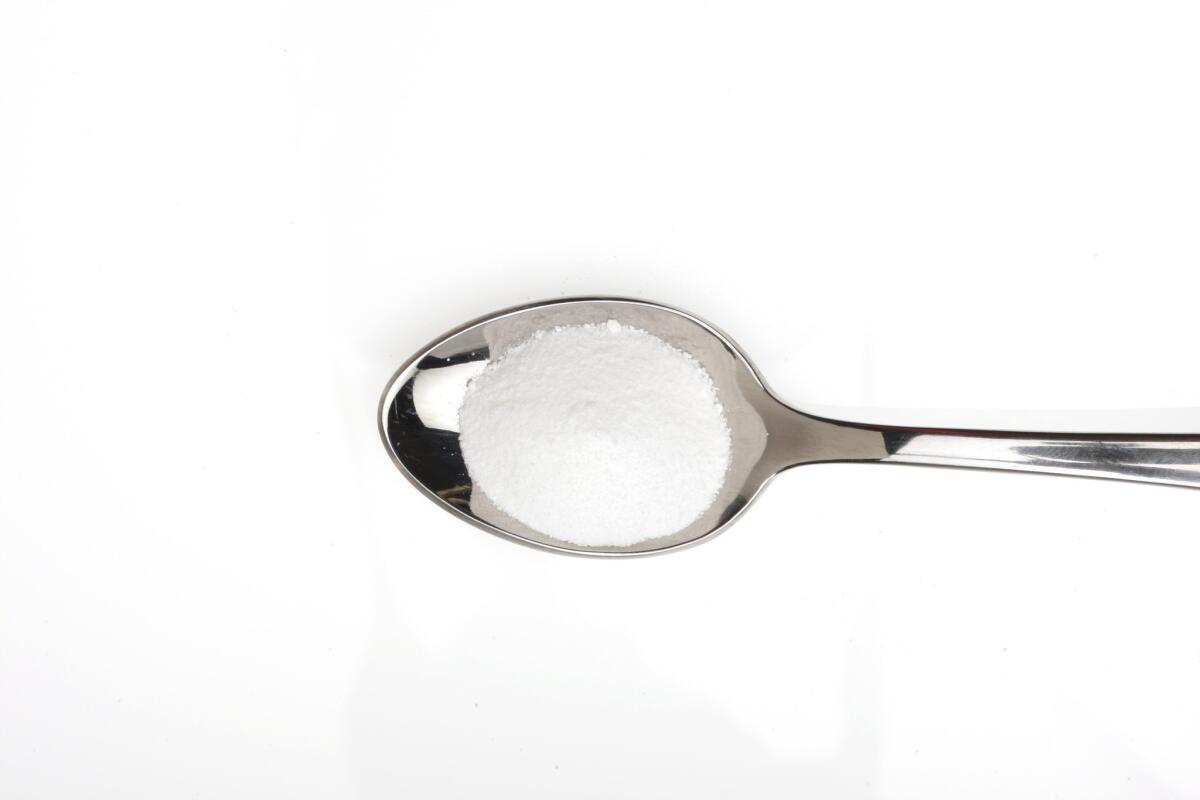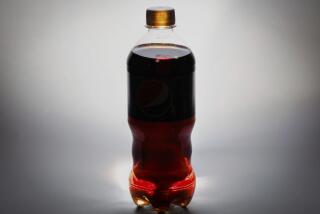Fake sweeteners may mess with the way our bodies metabolize sugar

- Share via
Diet sodas and those packets of artificial sweetener you put in your coffee may not be as benign as we thought, a new study suggests.
High doses of artificial sweeteners like saccharin, sucralose and aspartame can change the population of healthy gut bacteria in mice and in some humans. And those changes can affect how well their bodies metabolize sugar, according to a study published Wednesday in the journal Nature.
“We are by no means prepared to make recommendations about the use and dose of sweeteners, but these results should prompt additional study and debate on the massive use of artificial sweeteners,” said Eran Segal a computational biologist at the Weizmann Institute of Science in Israel and a senior author of the paper.
Artificial sweeteners are not digested by the human body, which is why they have no calories. However, they still must pass through our gastrointestinal tract, where they encounter the vast ecosystem of bacteria that thrive in our guts. These bacteria, though not technically part of our bodies, still play an important role in our physiology, including how we process glucose and other sugars.
To find out whether artificial sweeteners affect healthy gut bacteria, the researchers embarked on a series of experiments.
In the first round, the scientists added saccharine, sucralose or aspartame to the drinking water of different groups of mice. Other mouse groups got the real sugars glucose or sucrose (a combination of glucose and fructose) in their water, and a control group got plain, unsweetened water. After 11 weeks, the mice that received the artificial sweeteners showed higher levels of glucose intolerance compared with the others -- a sign that their bodies were doing a worse job of processing sugar. (Among other things, this causes blood sugar to be too high, and is often a precursor to Type 2 diabetes).
The researchers saw the same result when the experiment was run on mice that were fed a high-fat diet -- a model of what happens when people rely on artificial sweeteners to help them lose weight (or at least gain less weight).
To see whether the gut microbiome had anything to do with the link between drinking artificial sweeteners and developing glucose intolerance, the researchers gave the mice antibiotics for four weeks to pretty much wipe out their gut bacteria. After that time, all the mouse groups were able to metabolize sugar equally well.
This was the first evidence that the bacteria in the mice’s gut was being affected by the artificial sweetener.
Next, the researchers transplanted gut bacteria from mice that had consumed saccharin into other mice that had no gut bacteria of their own. Six days later, those mice had lost some of their ability to process sugar.
Genetic analysis revealed that the composition of the gut bacteria in mice had indeed changed after exposure to the artificial sweetener -- some types of bacteria became more abundant, while others shrank.
“Many of the pathways that changed are pathways that have been previously linked to susceptibility of obesity and adult onset diabetes,” said Dr. Eran Elinav, the co-senior author of the study and researcher at the Weizmann Institute.
Experts agree that the study, up to this point, is excellent.
“This is not the first study looking at sweeteners and the microbiota, but it is one of the most complete studies,” said Sridevi Devaraj, an associate director of Texas Children’s Microbiome Center in Houston, who was not involved with the research. “They tried to answer several different questions that may arise.”
The most obvious question, of course, is whether artificial sweeteners would have the same effect on the guts of humans as they do on the guts of mice.
The researchers made some preliminary attempts to answer this question.
First, they looked at a group of 381 people who are involved in a continuing clinical nutritional study and found that the gut bacteria of people who regularly consumed artificial sweeteners looked different from people who did not. They also found correlations between those who use artificial sweeteners and those who weighed more and had higher fasting blood sugar, a condition that can cause heart problems, kidney disease, eye issues and other health problems. But they couldn’t say that either artificial sweeteners or gut bacteria were causing weight gain or high blood sugar levels. (It should be noted that the InterAct study of 350,000 people in Europe found no relationship between artificial sweetener consumption and any health problems).
Finally, the researchers ran a limited experiment with seven healthy, non-obese volunteers who did not regularly consume artificial sweeteners. For one week, these seven people were given high doses of artificial sweeteners – what experts said was the equivalent of 40 cans of diet soda a day. They also wore a monitor that checked their blood sugar levels every five minutes.
Four of the people in the study developed an impaired glycemic response by the end of the week, meaning they lost some of their ability to metabolize sugar. Meanwhile, the other three people saw no change at all.
Intriguingly, the researchers said a computer algorithm looked at the gut microbes of the seven people and clustered them into two groups. One group contained those who were affected by the artificial sweeteners, and the other group contained those who were not.
Although the human aspect of this study is interesting, it is far from conclusive, other researchers say.
“The data in mice are very, very clear,” said Cathryn Nagler, who studies the microbiome at the University of Chicago. “The limited amount of research they did on humans at least suggests we need to examine our artificial sweetener use more carefully.”
She said artificial sweeteners may well belong on the list of diet and lifestyle changes that are implicated in the rise of “diseases of the Western lifestyle” like diabetes, obesity and food allergies, none of which were as prevalent 50 years ago.
“Our microbiota have co-evolved with us over millennia, but they are not evolved for a McDonald’s diet, or consistent antibiotic use,” she said. “Now, I would say we could add artificial sweeteners to this list.”
Devaraj said she would like to know whether the pre-diabetes symptoms that the mice developed after consuming artificial sweeteners would lead to full-blown diabetes over time.
“The jury is still out with regards to whether these sweeteners actually cause weight gain,” she said. “I think it begs for a really good study in humans.”
The original researchers agree.
“We are not at the point to make a change, but we are at a point to promote discussion in the medical, scientific and general community,” Elinav said.
In the meantime, he said he has stopped putting artificial sweeteners in his coffee.
Do you love to learn? Follow me @DeborahNetburn and “like” Los Angeles Times Science & Health on Facebook.







